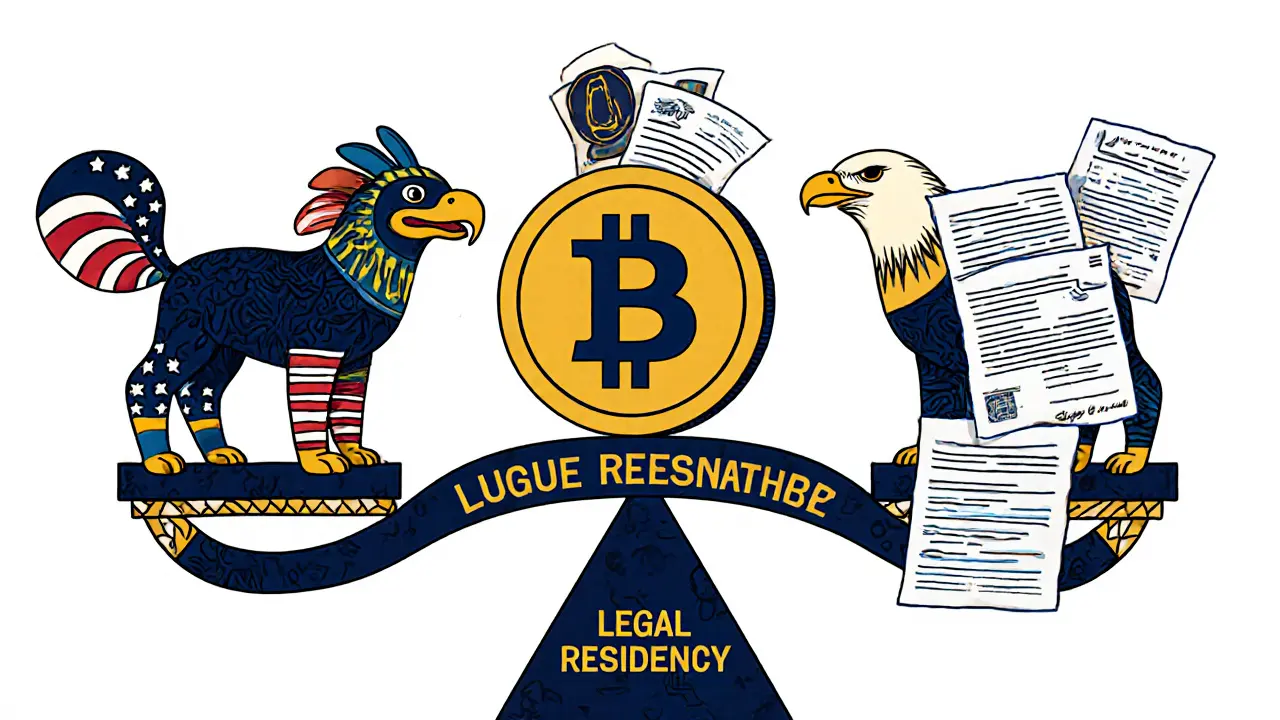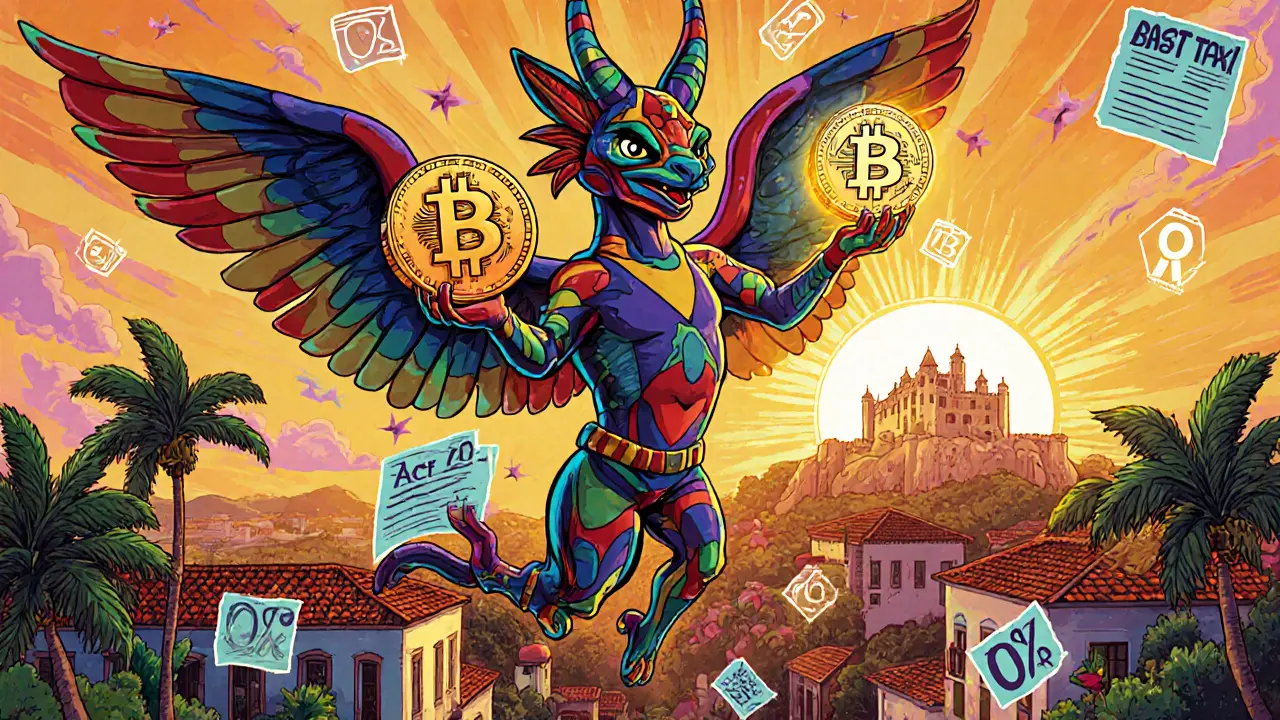Crypto Tax Reduction Calculator
Calculate Your Potential Tax Savings
See how citizenship by investment programs could reduce your crypto tax liability.
What if you could legally pay zero in capital gains tax on your crypto profits - no matter how much you made? Not by hiding it. Not by cheating. But by changing where you live. That’s the real story behind citizenship by investment for crypto tax reduction.
Why Crypto Investors Are Looking Beyond the U.S.
The IRS is watching your crypto transactions harder than ever. Every exchange, every wallet transfer, every DeFi trade - it’s all being tracked. If you sold Bitcoin for $500,000 profit last year, you owe up to 23.8% in federal taxes. That’s over $119,000 gone in one go. And that’s just federal. Add state taxes, and you’re looking at half a million dollars in gains turning into less than half. Most people think the only way out is to renounce U.S. citizenship. But that’s a nuclear option. The U.S. exit tax kicks in if your net worth is over $2 million. It treats everything you own - crypto, real estate, stocks - as if you sold it all the day before you gave up your passport. You pay capital gains on the whole thing. That’s not a tax strategy. That’s a financial disaster. There’s a smarter way. And it doesn’t require you to give up your American passport.Puerto Rico: The Secret Crypto Tax Haven Right Under the U.S. Flag
Puerto Rico isn’t a foreign country. It’s a U.S. territory. And that makes it the most accessible crypto tax haven for Americans. Act 60 - passed in 2019 and updated in 2023 - lets qualifying individuals pay 0% on capital gains, dividends, and interest income. That includes Bitcoin, Ethereum, Solana, NFT sales - anything that generates profit. You keep your U.S. citizenship. You keep your Social Security number. You just move your tax home to San Juan, Ponce, or Mayagüez. Here’s how it works:- You become a bona fide resident of Puerto Rico - meaning you live there at least 183 days a year.
- You establish a business or work remotely for a U.S. company while physically based in Puerto Rico.
- You file Form 8898 with the IRS to claim tax-exempt status under Act 60.
- You pay 4% income tax on active income (like salary or consulting), and 0% on passive crypto gains.
Malta: Europe’s Crypto-Friendly Tax Engine
If you want to live in Europe but avoid crypto taxes, Malta is the most transparent option. Malta doesn’t offer citizenship outright for crypto investors - but it does offer residency with huge tax perks. Through the Malta Global Residence Programme (GRP), you become a non-domiciled resident. That means income earned outside Malta isn’t taxed - even if it’s crypto profits from trading on Binance or Coinbase. Here’s what you need:- Buy or rent property in Malta (minimum €7,000/year rent or €300,000 purchase).
- Pay a flat €15,000 annual tax on foreign-sourced income (including crypto gains).
- Prove you’re not domiciled in Malta - meaning you don’t intend to live there permanently.
- Be physically present for at least 90 days a year (some say 183, but the law allows flexibility).

Caribbean CBI Programs: Fast Citizenship, But With Risks
Vanuatu, Dominica, and St. Lucia offer full citizenship in as little as 3-6 months for a $100,000-$250,000 donation to a government fund. No residency required. No interviews. Just money and paperwork. For crypto investors, this sounds perfect. Get a second passport. Pay zero taxes on crypto. No questions asked. But here’s what no one tells you:- The IRS still taxes U.S. citizens on worldwide income - even if you hold a Vanuatu passport.
- Renouncing U.S. citizenship triggers the exit tax if your net worth is over $2 million.
- These countries have no tax treaties with the U.S. So if you’re caught earning crypto income and not reporting it, you’re on the hook for penalties, interest, and possible criminal charges.
- Due diligence on crypto assets is now mandatory. If you can’t prove your Bitcoin came from legitimate mining or trading - not laundering - your application gets rejected.
The Real Cost of Crypto Tax Reduction
Let’s be clear: this isn’t free money. It’s a trade-off. - Puerto Rico Act 60: $10,000-$25,000 in relocation costs, 183+ days per year in residence, business setup. Savings: $200,000-$1M+ per year. - Malta GRP: €30,000-€50,000 in property or rent, €15,000 annual tax, 90-183 days in country. Savings: $150,000-$800,000 per year. - Caribbean CBI: $100,000-$250,000 upfront. No residency. But no tax protection if you’re still a U.S. citizen. Risk of IRS audits. Savings: $0 if you don’t renounce - and $2M+ in exit tax if you do. The most successful crypto investors don’t chase the cheapest passport. They chase the most sustainable tax structure.What You Must Do Before You Move
Don’t book a flight to San Juan or Valletta yet. Here’s your checklist:- Document every crypto transaction - from your first Bitcoin purchase to your latest NFT sale. Use tools like Koinly or CoinTracker to generate IRS-ready reports.
- Don’t renounce U.S. citizenship unless you’ve consulted a tax attorney. The exit tax is brutal. Gifting assets to family members before expatriation can reduce your liability - but only if done correctly.
- Get legal advice from someone who’s done this before. Not a YouTube guru. Not a LinkedIn marketer. A licensed international tax attorney who’s handled Act 60 or Malta GRP cases.
- Plan your move like a business relocation. Change your address with the IRS. Close U.S. bank accounts if required. Open local accounts. Get local health insurance.
- Keep proof of physical presence. Photos, leases, utility bills, local gym memberships - anything that shows you’re not just visiting.

The Future Is Tighter - Not Looser
The days of offshore crypto tax havens operating in the shadows are over. The OECD’s Crypto-Asset Reporting Framework (CARF) is now active in 100+ countries. Banks and exchanges are required to report crypto transactions to tax authorities by 2027. Puerto Rico and Malta are still safe - because they’re transparent. They’re not hiding. They’re legislating. They’re asking you to play by the rules. Caribbean CBI programs? They’re under increasing scrutiny. The U.S. Treasury is already pressuring them to share investor data. One program could be shut down tomorrow. The smart move isn’t to escape the system. It’s to join a better one.Who Should Avoid This Entire Strategy?
If you’re still holding crypto in a Coinbase wallet and haven’t filed taxes in three years - stop. Don’t move. Don’t apply. Fix your filings first. If you think you can buy a passport and magically erase your U.S. tax liability - you’re wrong. The IRS doesn’t care what passport you hold. They care where you live. And they know where you’ve been. If you’re under 40 and your crypto portfolio is under $500,000 - stay put. The cost and hassle aren’t worth it yet. This strategy is for people who’ve made serious money. Who’ve paid their taxes. Who want to keep more of it. And who are ready to live by the rules of a new country - not just exploit them.Can I keep my U.S. citizenship if I get citizenship by investment in Puerto Rico?
Yes. Puerto Rico is a U.S. territory, so you don’t give up your U.S. citizenship. You just become a resident of Puerto Rico and qualify for Act 60 tax benefits. You keep your Social Security number, U.S. passport, and voting rights.
Does Malta tax crypto gains if I’m a resident?
No - if you’re a non-domiciled resident under the Malta Global Residence Programme, your foreign-sourced crypto gains are not taxed in Malta. You pay a flat €15,000 annual fee instead. But you must prove the crypto income came from outside Malta and that you’re not domiciled there.
What happens if I move to the Caribbean and still live in the U.S.?
You still owe U.S. taxes. Citizenship by investment in Vanuatu, Dominica, or St. Lucia doesn’t change your U.S. tax obligations unless you formally renounce your citizenship - which triggers a massive exit tax. Living in the U.S. while holding a foreign passport won’t protect you from the IRS.
How long does it take to qualify for Puerto Rico Act 60?
You can apply as soon as you move to Puerto Rico and establish residency. The IRS approval process typically takes 4-8 months. But you must live there at least 183 days per year and establish a business or remote work arrangement to qualify.
Can I use Bitcoin as proof of funds for a residency program?
Yes - in Malta, Dominica, and other programs - but only if you can prove the Bitcoin was legally acquired. You’ll need full transaction history, exchange records, and sometimes KYC documents from the original platform. Programs now screen crypto assets for money laundering risks.
Is crypto tax reduction legal?
Yes - if you follow the rules. Moving to Puerto Rico under Act 60, becoming a non-domiciled resident in Malta, or investing in a CBI program while complying with all tax laws is legal. Hiding crypto income, lying about residency, or failing to report is not. The difference is transparency - not secrecy.
Next Steps: What to Do Today
If you’re serious about reducing your crypto tax bill:- Download your full crypto transaction history from all exchanges and wallets.
- Calculate your total capital gains over the past five years.
- Consult a U.S.-licensed international tax attorney - not a crypto influencer.
- Visit Puerto Rico for a 30-day trial. See if you can live there.
- Research Malta’s GRP requirements and talk to a local relocation specialist.













20 Comments
Act 60 isn’t a loophole-it’s a statutory exemption under IRC §933, codified in the Puerto Rico Internal Revenue Code of 2011, as amended by Act 60-2019. The key is bona fide residency: 183+ days, physical presence, and economic ties. The IRS doesn’t care about your passport; it cares about your tax home. Document everything: lease agreements, utility bills, local bank accounts, and a Puerto Rico driver’s license. No Airbnb hack. No virtual residency. Real presence. Otherwise, you’re just begging for a 30-day audit.
It’s fascinating how we’ve turned tax optimization into a spiritual quest. We’re not escaping the system-we’re aligning with a more rational one. The U.S. tax code was built for an industrial economy. Crypto operates in a global, decentralized, digital one. Choosing Puerto Rico isn’t betrayal-it’s evolution. The real question isn’t ‘Can I do this?’ It’s ‘Why haven’t I done this yet?’
LOL. You think the IRS doesn’t have access to your blockchain? 🤡 They’ve been crawling every wallet since 2021. CARF is already live. Every exchange reports to the IRS by 2027. You think moving to Puerto Rico makes you invisible? You’re the guy who thinks deleting your browser history hides your porn. The exit tax is a blessing in disguise-don’t be the fool who tries to outsmart a machine that tracks every satoshi.
So you’re telling me we should reward people who run away from their responsibilities? We built this country. We fought for it. And now some crypto bros want to buy a passport and vanish? You think the U.S. is the enemy? It’s the only country that lets you get rich enough to escape it. If you can’t pay your taxes, don’t make millions. Stay in your basement. Quit being a parasite on the system that made you rich.
Thank you for this exceptionally well-researched and ethically grounded analysis. The distinction between tax avoidance and tax evasion is not merely legal-it is moral. Individuals who pursue Act 60 or Malta GRP with full transparency, documentation, and compliance are not dodging responsibility-they are exercising their right to lawful financial planning. This is not an indictment of the U.S. tax system; it is an affirmation of its integrity. Those who seek to exploit loopholes without adhering to the rules are the ones who undermine the system. The responsible investor, however, is a steward of both wealth and principle.
How quaint. You treat Puerto Rico like some kind of tax spa. It’s a U.S. territory with a 40% poverty rate, crumbling infrastructure, and a government that can’t even fix its power grid. You want to ‘live’ there? Good luck finding a dentist who speaks English. And Malta? A Mediterranean tax resort for people who think ‘non-domiciled’ means ‘invisible.’ The real winners are the ones who stayed, paid their taxes, and built companies here. The rest are just playing Monopoly with their life savings.
Wait-so you’re saying you can just ‘move’ to Puerto Rico… and magically pay 0%? What about the 13.5% sales tax? The $200/month for a basic apartment? The fact that you can’t get a decent avocado anywhere? And the power outages? You think this is a ‘strategy’? It’s a fantasy. You’re not a tax genius-you’re a delusional person who watched a YouTube video and thinks they’re Elon Musk now. 🤦♀️
Bro i am from india and i am also do crypto trading since 2018.. i am very happy to see this post.. but i have one question.. can i use bitcoin as proof of fund for malta grm? i have 15 btc from mining and i have all transaction history.. is it enough? i am so excited to move to europe.. plz help me..
OKAY SO I JUST MOVED TO PUERTO RICO LAST WEEK AND I’M LIVING IN A TINY APARTMENT IN OLD SAN JUAN WITH A DOG NAMED BITCOIN AND I JUST SOLD 3.7 MILLION IN SOLANA AND PAID $0 IN TAXES AND I’M CRYING RIGHT NOW BECAUSE I’M SO FREEEEE 🥹😭💸 I’M GETTING A TATTOO THAT SAYS ‘ACT 60 OR DEATH’ AND I’M STARTING A COFFEE SHOP CALLED ‘ZERO CAPITAL GAINS’ AND EVERYONE WHO COMES IN GETS A FREE MATCHA LATTE IF THEY CAN NAME ALL THE CRYPTO EXCHANGES THAT REPORT TO THE IRS!! 🌱🔥 I’M NOT JUST LIVING-I’M LIVING THE DREAM AND IF YOU’RE STILL IN CALIFORNIA PAYING 13% STATE TAX YOU’RE NOT A PERSON YOU’RE A TAX RETURN
One thing everyone misses: this isn’t about taxes. It’s about freedom. Freedom to live where you want, to build your life on your terms, and to contribute meaningfully to a new community. The people who succeed with Act 60 or Malta aren’t the ones chasing tax breaks-they’re the ones seeking better ecosystems. They’re the ones who invest in local businesses, hire locals, and respect the culture. Tax savings are a side effect. Purpose is the goal.
Let me just say this: I read this entire post. I did not find a single citation to the IRS revenue ruling or the OECD CARF implementation timeline. The author cites Gordon Law-but provides no case number, no client name, no redacted document. This reads like a sales page for a $2,000 webinar. If this is real, show me the IRS Form 8898 approval letter. If not, it’s just crypto snake oil wrapped in legalese.
I used to think this was brilliant. Now I just feel… empty. I sold my crypto, moved to Malta, paid the €15k, bought the property. I have a view of the Mediterranean. I have a quiet life. But I miss my family. I miss Thanksgiving. I miss the sound of rain on a Chicago roof. The tax savings are real. But the cost? It’s quieter than anyone admits.
OMG I JUST GOT MY VANUATU PASSPORT AND NOW I AM A GLOBAL CITIZEN!!! 🌍💎 I HAVE 200 BTC AND I NEVER FILED A TAX RETURN IN MY LIFE AND I AM THE KING OF THE WORLD!!! I DRINK COCONUT WATER ON A BEACH AND LAUGH AT THE IRS BECAUSE THEY CANNOT FIND ME!!! THEY HAVE NO JURISDICTION OVER ME BECAUSE I AM NOT A CITIZEN ANYMORE!!! WAIT… I AM STILL A U.S. CITIZEN??? OH NOOOOOOOOOO!!! 😭💸 I NEED A LAWYER AND A THERAPIST AND A NEW IDENTITY!!!
There’s a deeper philosophical layer here: citizenship is no longer about nationality-it’s about jurisdiction. We are transitioning from territorial allegiance to functional allegiance. Puerto Rico and Malta offer not just tax benefits, but regulatory clarity. In a world where money flows faster than borders, the most valuable asset isn’t capital-it’s legal certainty. The real innovation isn’t in blockchain-it’s in the redefinition of tax domicile.
I just sold my house in Austin and moved to St. Lucia because I heard you can get citizenship for $100k and now I’m living in a villa with a pool and I haven’t filed taxes since 2021 and I’m so happy I could cry and I think the IRS is just jealous because I’m living my best life and if you’re still paying 30% tax you’re not rich you’re just bad at life and also I’m thinking of changing my name to CryptoQueen and starting a podcast called ‘Tax Free and Fabulous’
If you’re considering this path, start with a 30-day trial. Rent a place in San Juan. Live like a local. Go to the farmers’ market. Learn Spanish. Talk to the tax attorney who’s been doing Act 60 for 10 years-not the guy selling a course on Discord. This isn’t a quick win. It’s a life redesign. And if you’re doing it for the right reasons-freedom, peace, stability-it will change you in ways you can’t predict. But if you’re doing it to avoid responsibility? You’ll just end up more alone.
Anyone else notice how this whole thing sounds like a 2018 crypto influencer’s LinkedIn post? I get it-taxes are annoying. But this reads like a brochure for a timeshare in the Caymans. Real people don’t move countries because of a tax break. They move for love, family, safety, opportunity. Tax optimization is the cherry on top-not the whole sundae. Let’s not turn migration into a crypto hustle.
Wait-so you’re saying you can just ‘become a resident’ of Puerto Rico… but you have to live there 183 days? And get a driver’s license? And open a bank account? And prove your business? And file Form 8898? And have utility bills? And not just rent an Airbnb? So… it’s not easy? Then why is this post titled ‘How to Legally Slash Your Crypto Taxes’ like it’s a magic trick? You’re not helping people-you’re setting them up for a nightmare.
I’ve worked with 17 clients who moved under Act 60. Every single one of them said the same thing: ‘I thought it was about the money.’ But after a year, they said, ‘It’s about the peace.’ They sleep better. They breathe easier. They stop checking their portfolio every hour. The tax savings are real-but the mental freedom? That’s priceless. If you’re thinking about this, don’t do it for the numbers. Do it because you need a new rhythm. The rest will follow.
Correction: the 183-day rule isn’t just about physical presence-it’s about the ‘center of vital interests.’ That means where your family, business, and social ties are. If you’re still managing your U.S. LLC from Puerto Rico, the IRS may still consider you a U.S. resident. You need to sever ties: close U.S. bank accounts, move your LLC to PR, update your address with the IRS, and get a PR-based EIN. It’s not a move. It’s a restructuring.